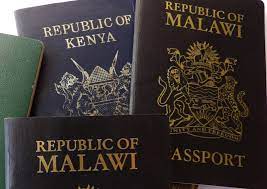After years of frustration and long delays, Malawians can finally breathe a sigh of relief as the government has started clearing a massive passport backlog that left thousands stranded without travel documents. The Ministry of Homeland Security confirmed that over 100,000 applications had piled up, but printing has now resumed with more than 1,000 passports already produced in just a few days.
Minister of Homeland Security, Ezekiel Ching’oma, said passport printing restarted last week in Lilongwe and has now reached full capacity. He explained that the backlog was a result of years of inefficiency and reliance on private contractors, which left the country vulnerable to disruptions. According to him, the current process is different because the system is now fully controlled by the Government of Malawi.
“This backlog is an accumulation of several years and now stands slightly above 100,000 applications,” the Minister said. “But I want to assure Malawians that printing will not be disrupted again. This time, the system is fully owned by the Malawi Government—unlike before when it was under private control.”
The new system, supplied by Madras Security Printers, comes with advanced digital technology, including biometric capture devices, secure web applications, data encryption, and a robust passport database. With a production capacity of 2,000 passports daily, authorities are confident that the backlog will be cleared faster than expected.
The new contract with Madras is worth $29.9 million (about K52.7 billion) for five years to produce 500,000 passports. It is significantly cheaper than the controversial Techno Brain deal, which was valued at $60.8 million but only covered 300,000 booklets over three years. That contract, signed under the former Democratic Progressive Party (DPP) government, was cancelled by Attorney General Thabo Chakaka Nyirenda after irregularities were discovered.
For ordinary Malawians, many of whom have been stuck for more than a year and a half without valid travel documents, this breakthrough has come as welcome news. Passports are essential not only for travel but also for education, business, health care abroad, and employment opportunities in the region.
Civil society groups have also welcomed the development. The National Advocacy Platform (NAP) coordinator, Benedicto Kondowe, said the resumption of printing is a relief but urged government to move faster in order to ease the suffering of citizens.
“Citizens have suffered for too long,” Kondowe said. “Extraordinary measures such as extended working hours, more staff deployment, and even faster technologies must be used to clear this backlog. The process must also remain transparent to restore public confidence in passport issuance.”
The government’s decision to adopt new technology and take full ownership of the system marks a turning point in Malawi’s passport services. In the past, many Malawians complained about corruption, inefficiency, and lack of accountability in the passport office. Long queues, unofficial payments, and unexplained delays had become common, leaving citizens frustrated and disillusioned.
With the new contract in place, authorities are promising smoother and more reliable services. Officials have also indicated that passport issuance will be more affordable and secure, with reduced opportunities for fraud.
Observers note that the speed at which the backlog is cleared will determine how much confidence Malawians can place in the new system. Some citizens remain cautious, recalling previous government promises that were never fulfilled. Others, however, believe that the cheaper Madras deal and government’s direct control signal a more sustainable solution for the country.
Analysts also point out that the shift from private contractors to government ownership could save the country billions of kwacha in the long run. It is also expected to reduce dependency on external companies for sensitive national services like passport production.
For now, the immediate priority remains clearing the over 100,000 pending applications. If the system maintains its projected output of 2,000 passports daily, the backlog could be cleared within two months. After that, attention will turn to ensuring new applications are processed without delays.
With Malawians eager to travel for business, education, medical treatment, and job opportunities, the resumption of printing marks a new chapter in the country’s efforts to restore credibility and efficiency to its passport services.
